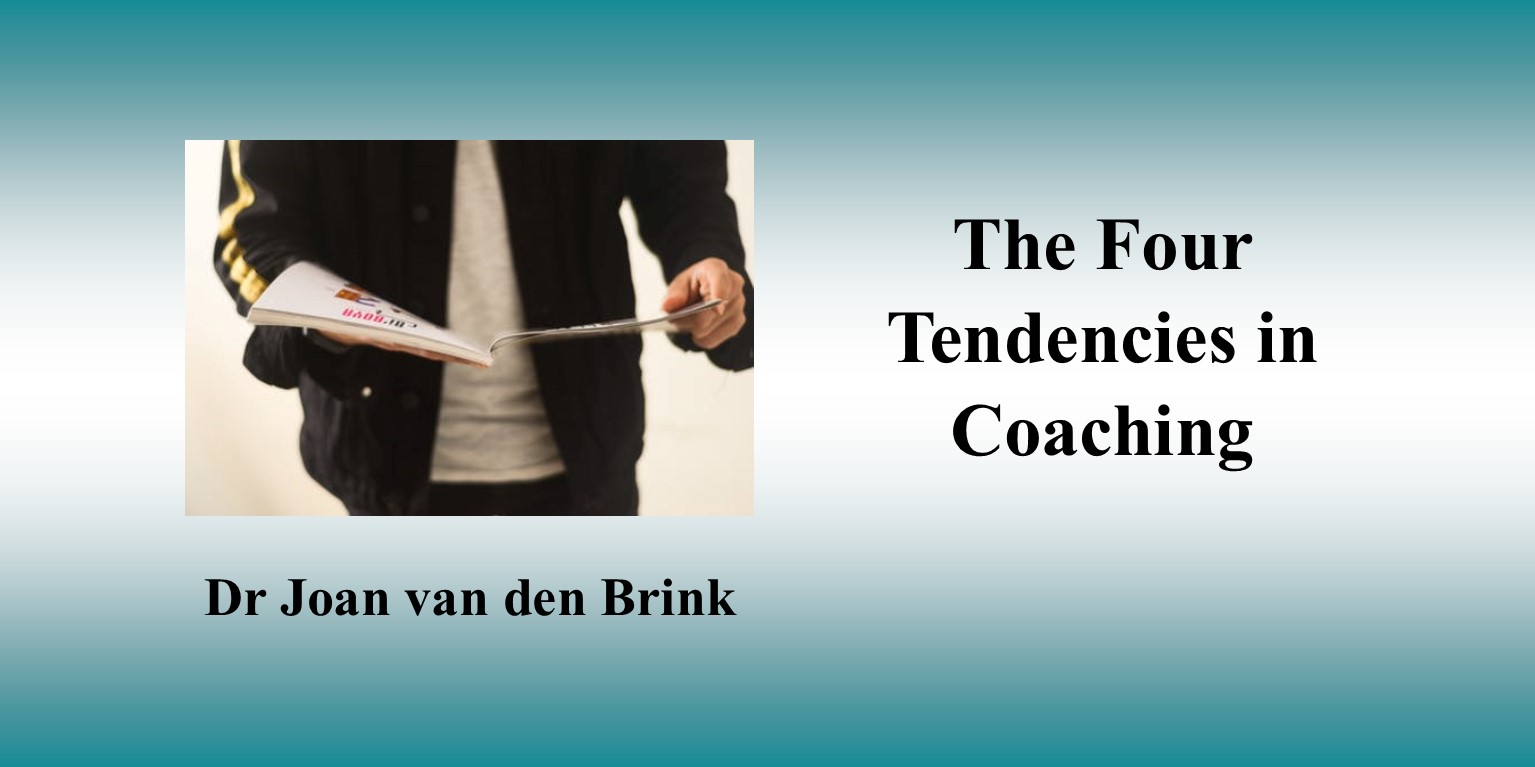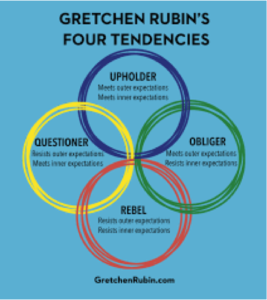
Upholders, Questioners, Obligers and Rebels. Knowing our own and others’ Tendencies gives us valuable insights that help us to better understand and relate to others, ease frustrations and develop strategies that smooth our interactions with them.

Article by Dr Joan van den Brink
I am an Upholder, what are you?
I am hardwired to meet both my internal and external expectations. I commit to the goals that I set myself e.g. eating healthily, exercising regularly and also generally behave in the manner expected of me by others e.g. deliver on work goals, obey the rules, etc. without much trouble. This has it pluses and minuses for me as I interact with others and influences how I behave as a coach.
I have been fascinated by Gretchen Rubin’s work examining how individuals respond to internal and external expectations.
She found that we fall into four categories:
Upholders are self-directed and have little trouble meeting their commitments; no need for supervision to keep them on track. They are conscientious, thorough and reliable and like to stick to a strategy. They can become rigid sticking to their routines and following the rules even when it no longer makes sense or inconveniences others. They can’t ‘let it go’. They can become uneasy when plans change or others break the rules.
Once Questioners make up their minds about the right course of action they follow through. They seek data and information to enable them to make informed decisions but can get caught up in analysis paralysis. Questioners want to understand why they are being asked to do something and will resist external expectations if they reject the justifications for them, especially if they seem arbitrary.
Obligers excel at meeting other people’s demands and deadlines. They have an active sense of obligation to others and so put those needs before their own. Sometimes these demands are self-imposed i.e. Obligers assume that other people have an expectation e.g. make the dinner, organise staff meetings etc., which may be incorrect. Obligers find it much harder to meet their inner expectations. They depend on outer accountability to follow through on their goals. If the burden of outer expectation becomes too heavy, Obligers can rebel i.e. they snap and refuse to meet the expectation. “I’ve given all I can, I can’t give anymore’.
Rebels do not like to be pinned down and value their freedom to choose what to do and when. They place a high value on authenticity and self-determination. Rebels can have as hard a time making themselves meet their internal expectations as others do in wanting them to fulfil external presumptions. Rebels enjoy defying conventions and proving others wrong. If a Rebel is asked to do something, they will very likely resist and this can cause problems for others, the harder they push, the stronger the opposition.
Knowing our own and others’ Tendencies gives us valuable insights that help us to better understand and relate to others, ease frustrations and develop strategies that smooth our interactions with them.
Coaches who want to use themselves as an instrument in the coaching relationship need to have self-insight so that they can understand their emotional and physical responses to what is happening in the here and now of the coaching encounter. For example, a coach who has an Upholder tendency may feel irritation at the client who fails to follow through on commitments made during the coaching sessions whilst an Obliger may (over) empathise with the struggles that the client is facing. We can monitor ourselves and determine how to utilise our presence to help the client gain more self-knowledge. Let’s say a client has Questioner tendencies and often asks for the rationale before taking on board an experiment during the coaching session. This may exasperate you as a coach. You can choose to inform your client about the body of work and outcomes related to what you are inviting them to do to allow them to commit to the experiment. And you can share how you experience the client’s resistance and ask him how this might translate to their work place. This could open up a fruitful discussion on how to improve their working relationships and ability to collaborate.
The other side of the coin is tuning into our clients and recognising how they respond to expectations. Our intuition can give us clues about how to help the client frame and commit to goals; an essential part of facilitating personal change. For example, clients with a Rebel Tendency will respond better to appeals to their identity and sense of choice. So, a coach could help uncover what the client identifies with and use powerful questions that determine whether the goals and actions articulated are in service of strengthening that identity or detracting from it. The coach can also encourage the client to come up with a range of options that they can choose from rather than nail them down to a tight action plan that they will resist.
The Four Tendencies framework[1]is a valuable tool to help us gain deeper insights to ourselves and facilitate a deeper inquiry and exploration by our clients as to why they do the things that they do. Clients can then determine strategies for overcoming internal resistance to achieve their personal and organisational goals. I encourage you to further explore this framework to get a more in-depth understanding of the Four Tendencies and how you might incorporate it into your coaching practice.
Take the quiz to discover your own Tendency.
Dr Joan van den Brink, “your personal chemist”, is a freelance management consultant and owner of Araba Consulting. She works with individuals and organisations to tailor solutions that make them stronger and more capable. Joan has had a rich experience in a wide-ranging career that spans Marketing, Operations, HR, Communications and Management Consulting in global and local public and private sector organisations. She has travelled extensively throughout her life, working in the Americas, Asia, Australasia, Africa, the Middle East and Europe.
[1]Rubin, G, The Four Tendencies,2017, Two Roads, Great Britain